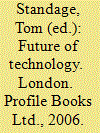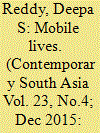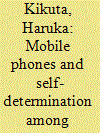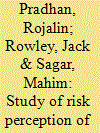|
|
|
Sort Order |
|
|
|
Items / Page
|
|
|
|
|
|
|
| Srl | Item |
| 1 |
ID:
067670


|
|
|
|
|
| Publication |
London, Profile Books Ltd., 2006.
|
| Description |
x, 358p.Pbk
|
| Standard Number |
1861979711
|
|
|
|
|
|
|
|
|
|
|
|
Copies: C:1/I:0,R:0,Q:0
Circulation
| Accession# | Call# | Current Location | Status | Policy | Location |
| 050676 | 658.514/STA 050676 | Main | On Shelf | General | |
|
|
|
|
| 2 |
ID:
139456


|
|
|
|
|
| Summary/Abstract |
This article explains the networked sociality of young Wa migrant workers made possible through the use of mobile phones and social media when these youths are on the move. Troubled by poor economic conditions in their rural homelands in southwest China, many Wa youth seek work in the urban manufacturing districts in southeast China. Most now rely on mobile phones to connect with the social media, QQ. Mobile networks promote a set of networked socialities which are integral to the continuity and development of Wa migrants’ ethnic ties. Their networking practices show both the constraints they face and the potentiality they develop for voicing social inequality and reconfiguring the dominant Chinese language ideology in urban work environments. Their networked sociality is virtual and yet rooted in their real-world activities involving fragmented engagements with mobile devices and everyday language use. The sociality that emerges is partly a matter of free-will and partly structure-constrained.
|
|
|
|
|
|
|
|
|
|
|
|
|
|
|
|
| 3 |
ID:
143550


|
|
|
|
|
| Summary/Abstract |
Much has been said and written about the role of the mobile phone in modulating social behaviours and cultural dynamics in India. Far less attention has been paid, however, to emerging cultural narratives about the phone which showcase the active, often troublesome and intrusive role the device plays in increasingly technologically inflected lives and landscapes. How are we to understand these new readings of the phone as itself a protagonist in our cultural lives? This essay uses a series of cultural reference points (movies, plays, news-media reports, popular music) to survey new metaphoric and symbolic terrains that the mobile phone guides us through. The mobile device's character, I argue, is totemic: it acquires the capacity to express desires, aspirations, and ambivalences; invoke social differences, and assert cultural norms. What Indian cultural narratives reveal is the desire for communion with the technologies which now both contain our natures and hold them up to view. The mobile phone plays a critical role in this process of reflection and self-making.
|
|
|
|
|
|
|
|
|
|
|
|
|
|
|
|
| 4 |
ID:
165965


|
|
|
|
|
| Summary/Abstract |
This paper examines the new ways to navigate family power dynamics among Muslim youth in contemporary Uzbekistan. Migration of labour from Uzbekistan increased rapidly in the 2000s. When young workers began to experience the freedom of making their own decisions in their everyday lives after migration, they became uncomfortable with the elders of the household making decisions on everything from daily chores to serious matters concerning their families. Youth who continued to live in Uzbekistan also expanded their areas of self-determination, such as in choosing their spouses, by securing private space through the use of mobile phones. The mobile phone can be an effective tool to improve the position of young wives, who tend to have the lowest status in the husband's family. Thus, the existing hierarchy or classical patriarchy in Muslim families can be navigated, challenged and circumvented by the use of mobile phones among the youth today.
|
|
|
|
|
|
|
|
|
|
|
|
|
|
|
|
| 5 |
ID:
140516


|
|
|
|
|
| Summary/Abstract |
Mobile technologies have brought about major changes in police equipment and police work. If a utopian narrative remains strongly linked to the adoption of new technologies, often formulated as ‘magic bullets’ to real occupational problems, there are important tensions between their ‘imagined’ outcomes and the (unexpected) effects that accompany their daily ‘practical’ use by police officers. This article offers an analysis of police officers’ perceptions and interactions with security devices. In so doing, it develops a conceptual typology of strategies for coping with new technology inspired by Le Bourhis and Lascoumes: challenging, neutralizing and diverting. To that purpose, we adopt an ethnographic approach that focuses on the discourses, practices and actions of police officers in relation to three security devices: the mobile digital terminal, the mobile phone and the body camera. Based on a case study of a North American municipal police department, the article addresses how these technological devices are perceived and experienced by police officers on the beat.
|
|
|
|
|
|
|
|
|
|
|
|
|
|
|
|
| 6 |
ID:
186303


|
|
|
|
|
| Summary/Abstract |
Due to the ever-increasing use of mobile communications in India, health risks associated with exposure to radiofrequency electromagnetic field (RF-EMF) transmitted by mobile phones and base stations has become the focus of research. Internationally, there have been numerous studies on RF-EMF risk perception, but this issue is scarcely addressed in India. The present study evaluates the level of risk perception of Indians associated with RF-EMF exposure from mobile phones and base stations and assesses the underlying reasons for their concerns. We conducted a qualitative study on a small group of Indians (n = 25) from varied socioeconomic backgrounds, followed by a large-scale population (n = 500) survey to identify the primary issues of concern. The results show that many participants, irrespective of their social group, have a positive attitude towards mobile phones and are willing to accept the risks of using them, but are against the installation of base stations. Our study confirms that lack of knowledge about mobile communications technology, health concerns about mobile phones and base stations, community concern regarding base station deployment and media influence have a significant impact on risk perception among Indians. Carefully planned communication techniques are required to decrease risk perceptions and increase acceptance of mobile communications infrastructure.
|
|
|
|
|
|
|
|
|
|
|
|
|
|
|
|
| 7 |
ID:
104004


|
|
|
|
|
| Publication |
2010.
|
| Summary/Abstract |
Among the urban Pakistani youth, SMS texts have become of critical importance in mediating religious and aesthetic sensations in unexpected domains of everyday life. Although grounded in a distinct valuation of the moral bearing of language upon individuals, texting religious messages is not simply a new way of pursuing a 'traditional' form of sociality. Texting reactivates religious texts with an unprecedented immediacy, and facilitates the expression of playfulness and visceral matters, empathy, humour and admonitions to embrace religious righteousness. This entanglement of discordant aspirations leads to a greater visibility of Islam, but does not suggest the emergence of a deliberative space. For this mediation is also about instigating affective responses that can unsettle the moral consistency advocated in religious SMSs. I argue that this ludic gesture orientated towards the restoration of Islamic morality introduces immediacy and circulation as critical parameters in the appreciation of authentic and effectual Islamic knowledge.
|
|
|
|
|
|
|
|
|
|
|
|
|
|
|
|
|
|
|
|
|